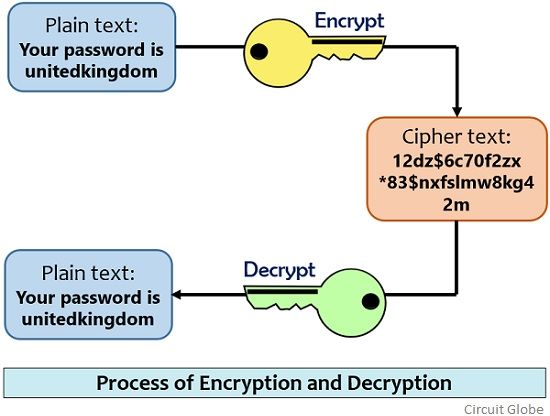Encryption and decryption both are the two processes utilized for secured communication across a network. The crucial difference between encryption and decryption is that encryption is the phenomenon of changing meaningful information (also known as plain text) into meaningless data (also known as ciphertext). As against decryption is the phenomenon of converting the ciphertext again into actual plain text.
Encryption and decryption are the two terms derived from a branch of science known as ‘Cryptology‘ which is a field of network security. This word cryptology is formed by two different words cryptography and cryptanalysis.
Cryptography involves changing of actual message into unintelligible information which is known as encryption. While Cryptanalysis is the change of unintelligible data back to the original message which is called decryption commonly.
Content: Encryption Vs Decryption
Comparison Chart
| Basis for Comparison | Encryption | Decryption |
|---|---|---|
| Function | Converts actual information into unintelligible format. | Changes unintelligible string back to normal human understandable form. |
| Performed at | Sender's side | Receiver's side |
| Converted text format | Cipher text | Plain text |
| Nature of conversion | Automatically | Either automatically or manually. |
Definition of Encryption
Encryption is the act of changing the information to be transmitted into an encrypted or meaningless format so as to have secured transmission of the data.
We know that at the time of transmitting any information, the foremost thing needed to be considered is the security of the data. As if proper measures are not taken then it will lead to unauthorized access of the information. So at the time of transmission, despite sending the actual message, the sender transmits a coded form of the message.
This definitely does not change the actual message to be transmitted but prevents any illegal access to that message. Even if any third party illegally manages to access the data then due to encryption, that party will not be able to get the meaning of the received data.
So, in this way encryption prevents loss of information because of unauthorized access of data.
Definition of Decryption
Decryption is defined as the conversion of encrypted data again to its originally generated format. Decryption is performed at the destination to which actually the data belongs. After the transmission of data in an encrypted format the receiver on gaining the access of the transmitted information changes received data into the actual message.
Basically, the key utilized to perform encryption at the sender’s side is used by the receiver to decrypt the received data so as to have the actual message. So, in this way even after receiving a coded message the receiver can determine what actually the sender wants to communicate. Hence in this way, only the desired destination gets the actually transmitted data.
Key differences Between Encryption and Decryption
- Encryption allows conversion of plain text into ciphertext. While decryption is a technique of changing ciphertext into plain text.
- Encryption is performed at the sender’s end while decryption is done at receiver’s end.
- Encrypted data is called ciphertext. As against decrypted data is known as plain text.
- Encryption is an automatic process of the transmitter. While decryption is generally automatic but in some systems, it is a manual operation.
Conclusion
So from this discussion, we can conclude that encryption and decryption both are the two sides of the same coin that combinely permits secured transmission of data without any loss in the midway.


Great comparison. Difference very clear now.